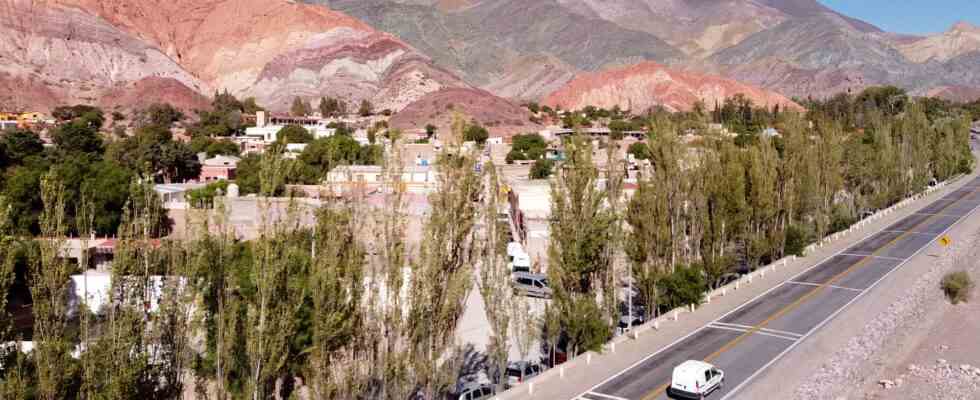world mirror
Status: 01/29/2023 08:48 a.m
Chancellor Scholz’s trip to South America is also about raw materials – especially lithium. In Argentina, however, there is resistance to mining – environmentalists fear that nature will be sold out.
Farmer Clemente Flores likes to laugh and talk about his family and his llamas. On one subject, however, he becomes serious, almost angry. It’s about the raw material lithium. “We are destroying the region’s ecosystem with all its life so that it will be believed elsewhere to be green energy,” he says. “But it’s not. Green energy is just a business.”
On this day, Flores drives to a protest against the mining of lithium in his homeland. Lithium is the so-called “white gold” that is used for batteries in smartphones, robotics and, above all, in electric cars. In the north of the country is the so-called lithium triangle with Chile and Bolivia. Around 60 percent of the world’s reserves are located here. The Chinese and Canadians are already there, and BMW also buys its lithium here.
Industrialized nations like Germany are currently hungry for raw materials, not least to advance their energy transition. The federal government subsidizes the purchase of electric cars. One million vehicles have now been registered, and it is expected to be 15 million by 2030. Observers then expect a first lithium bottleneck.
Argentinian villagers protest against lithium mining in industrialized nations
Xenia Böttcher, ARD Rio de Janeiro, Weltspiegel 6:30 p.m., January 29, 2023
Danger for the water table
Whether there is even enough raw material for the demand is scientifically disputed. Above all, many worry that lithium mining could lower the water table. Studies contradict each other on this question, but that is exactly what needs to be clarified, says Flores.
He fears a catastrophe for his homeland. The industry “uses a lot of fresh water, and especially salt water, because that’s where the lithium is in. If they keep doing this, we can all pack up and leave because everything’s going to die here.”
It goes past mountains in the most varied of colors and large cacti. The area here is a rough, barren paradise at an altitude of 4000 meters. The earth is dry because it rains very little here anyway. What are humans and animals supposed to live on when it gets even drier?
Farmer Flores says “if things continue like this, we can all pack up here.”
Image: Xenia Böttcher/Weltspiegel
Lawyers advise the local population
Arrived in Alfarcito: About fifty indigenous people from the region have arrived. Environmental activists and lawyers from Buenos Aires also came. They advise the communities about their rights because nobody else would, says Enrique Viale. He is an environmental lawyer. According to Viale, the climate crisis must be fought, but not by replacing all petrol engines with electric cars. In Germany, in the Global North in general, you have to rethink your lifestyle and ask whether everyone really needs their own car and laptop.
“Our nature cannot be sacrificed so that every American or every European has a Tesla,” says Viale. “This consumption overloads the earth, there is not enough lithium either. That needs to be reconsidered.” Nature cannot be sacrificed for the global North’s energy transition.
Large parts of the world’s lithium reserves are located here, in Argentina.
Image: Xenia Böttcher/Weltspiegel
German government’s charm offensive
Because of the climate crisis and because of the war in Ukraine, the federal government in South America is on a charm offensive. Argentina is the first of three countries that the Chancellor will visit.
The German government’s special representative for international climate policy, Jennifer Morgan, was only there in November. She explained at the time that she was looking for partners while respecting human rights and environmental standards. “We are in the middle of a climate crisis, an energy crisis, and we actually need raw materials and green hydrogen to implement our energy transition,” said Morgan. “And in South America, in Argentina, there are bombastic resources.”
Indigenous people from the Alfarcito region and environmental activists fear that their homeland will be sold out.
Image: Xenia Böttcher/Weltspiegel
Energy export as a way out of the crisis
Argentina is also looking for partners, the country has been in an economic crisis for years, which has been exacerbated by the pandemic. The country recorded about 95 percent inflation in 2022, a sad record in the last three decades. The export of energy could be a way out of the crisis, says economics expert Esteban Medrano. “After all, Argentina has some advantages that it must try to use for economic productivity.” This includes “both the use of traditional energies and the possibility of generating renewable energies.”
Population fears sell-off
In Alfarcito, the indigenous people are very critical of this argument. Argentina is in a weak position because it needs money. Flores even fears a sell-off. In his opinion, they live here from and with nature and have not contributed to climate change. But their environment should now be used for the green transition in Germany, without the consequences being really clear.
Together they inscribe a huge balloon: “All together we protect our water”, is written on it. With the wind and the warmth of the sun, they let it rise into the sky. According to Flores, it is a small contribution for more visibility, “to show everyone that there is life here”.
You can see the detailed report on the subject in Weltspiegel – on Sunday at 6:30 p.m. in the first.

